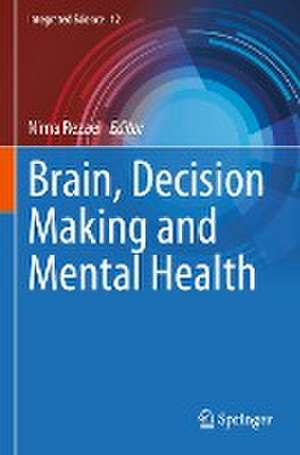Brain, Decision Making and Mental Health: Integrated Science, cartea 12
Editat de Nima Rezaeien Limba Engleză Paperback – 4 ian 2024
| Toate formatele și edițiile | Preț | Express |
|---|---|---|
| Paperback (1) | 1401.48 lei 43-57 zile | |
| Springer International Publishing – 4 ian 2024 | 1401.48 lei 43-57 zile | |
| Hardback (1) | 1407.96 lei 43-57 zile | |
| Springer International Publishing – 3 ian 2023 | 1407.96 lei 43-57 zile |
Din seria Integrated Science
-
 Preț: 368.79 lei
Preț: 368.79 lei - 5%
 Preț: 1421.76 lei
Preț: 1421.76 lei - 5%
 Preț: 1029.14 lei
Preț: 1029.14 lei - 5%
 Preț: 1413.58 lei
Preț: 1413.58 lei - 18%
 Preț: 1391.21 lei
Preț: 1391.21 lei - 5%
 Preț: 1435.85 lei
Preț: 1435.85 lei - 18%
 Preț: 1223.74 lei
Preț: 1223.74 lei - 15%
 Preț: 700.10 lei
Preț: 700.10 lei - 18%
 Preț: 1011.90 lei
Preț: 1011.90 lei - 18%
 Preț: 730.97 lei
Preț: 730.97 lei - 18%
 Preț: 720.53 lei
Preț: 720.53 lei - 5%
 Preț: 1433.27 lei
Preț: 1433.27 lei - 24%
 Preț: 841.48 lei
Preț: 841.48 lei - 18%
 Preț: 1107.41 lei
Preț: 1107.41 lei - 18%
 Preț: 1114.96 lei
Preț: 1114.96 lei - 5%
 Preț: 1308.74 lei
Preț: 1308.74 lei - 5%
 Preț: 1118.94 lei
Preț: 1118.94 lei - 18%
 Preț: 969.13 lei
Preț: 969.13 lei - 15%
 Preț: 636.12 lei
Preț: 636.12 lei - 5%
 Preț: 713.91 lei
Preț: 713.91 lei
Preț: 1401.48 lei
Preț vechi: 1709.12 lei
-18% Nou
Puncte Express: 2102
Preț estimativ în valută:
268.21€ • 278.98$ • 221.42£
268.21€ • 278.98$ • 221.42£
Carte tipărită la comandă
Livrare economică 14-28 aprilie
Preluare comenzi: 021 569.72.76
Specificații
ISBN-13: 9783031159619
ISBN-10: 3031159616
Pagini: 734
Ilustrații: XI, 734 p. 172 illus., 117 illus. in color.
Dimensiuni: 155 x 235 mm
Greutate: 1.03 kg
Ediția:1st ed. 2023
Editura: Springer International Publishing
Colecția Springer
Seria Integrated Science
Locul publicării:Cham, Switzerland
ISBN-10: 3031159616
Pagini: 734
Ilustrații: XI, 734 p. 172 illus., 117 illus. in color.
Dimensiuni: 155 x 235 mm
Greutate: 1.03 kg
Ediția:1st ed. 2023
Editura: Springer International Publishing
Colecția Springer
Seria Integrated Science
Locul publicării:Cham, Switzerland
Cuprins
1. Introduction on Brain, Decision-Making, and Mental Health.- 2. Relational Thinking and The Cultural Conditionality of Human Understanding.- 3. Science and The Spectrum of Critical Thinking.- 4. Rhetoric and the Stases: A Universal Critical Thinking Problem-Solving Framework for the Sciences and Arts.- 5. Conceptual Development and Change: The Role of Echoing and Contrast as Cognitive Operations.- 6. Critical Thinking Across the Sciences.- 7. Models of Medical Reasoning.- 8. The “Irrational” within Rational Thinking: Proofs from Medical Sciences and the Arts.- 9. Shaping Clinical Reasoning.- 10. Critical Thinking in Nursing.- 11. Fostering Critical Thinking Among Pre-Service Teachers Through A Multiple Representation-Based Collaborative Pedagogical Approach.- 12. COVID-19: A Context to Promote Critical Thinking and Argumentation in Secondary and University Students.- 13. Thinking, Feeling, And Moving: Competition for Brain Resources in Health and Disease.- 14. Hypothesized Mechanisms of Cognitive Impairment During High-Intensity Acute Exercise.- 15. The Role of Cortisol in Cognitive Emotion Regulation Failure.- 16. Incorporating Mindfulness Practice for Better Performance in Work and Daily Life.- 17. Increasing Well-Being and Mental Health through Cutting-Edge Technology and Artificial Intelligence.- 18. Thought Content and Thinking Processes in Psychotherapy: Cognitive Versus Metacognitive Approaches.- 19. Can the Phylogeny of Compassion Focused Therapy and The Ontogeny of Transactional Analysis Go Beyond Dual-Process Theories and Propose Multiple Modes of Thinking?.- 20. Decision-Making in Integrated Contexts: Epistemological, Methodological and Cognitive Choices–Towards New Requirements in Psychological Research?.- 21. Modelling Social Action: From Biological to Social (Re)Constructions Enabling, Constraining, and Motivating Social Decision-Making.- 22. Decision-Making Styles and Decision Outcomes.- 23. Thinking about Decisions: How Human Variability Influences Decision-Making.- 24. Searching for Criteria for A Thinking Machine.- 25. The Irreducible Immateriality of Meaning and Its Crucial Role For Artificial, Human, and (Maybe) Non-Human Intelligence.- 26. Computational Model of The Mind: How to Think About Complex Systems in Nature.- 27. The Brain as A Vision and Program: From “Embodiment” to “Embedment”.- 28. Image, Imagination, Magic, Imaginary: Contemporary Experience and Cognition.- 29. Neurodesign: The Biology, Psychology, and Engineering of Creative Thinking and Innovation.- 30. Intellectual Mechanisms of Solving of Problematic Situations with a High Degree of Uncertainty.- 31. Art in The Twilight of Consciousness.- 32. Brain, Decision-Making, and Mental Health 2050.
Textul de pe ultima copertă
Brain, Decision Making, and Mental Health acknowledges that thinking is not a constant phenomenon but varies considerably across cultures. Critical thinking is particularly important in bridging thinking divisions and its applicability across sciences, particularly medical sciences. We see critical thinking as educable and the arts as means to achieve this purpose. We address the multidimensional relationship between thinking and health and related mechanisms. Thinking mainly affects emotion regulation and executive function; in other words, both mental and physical health are related as a function of thoughts. Considering the thinking‐feeling‐emotion regulation/executive function pathway, it would be reasonable to propose thinking capacities‐based interventions to impact emotion regulation and executive function, such as mindfulness and psychotherapy. We review decision-making taking place in integrated and social contexts and discuss the decision-making styles-decision outcomes relation. Finally, artificial thinking and intelligence prepare us for decision-making outside the human mind.
Caracteristici
Applies critical thinking to bridge divisions in thinking across sciences Addresses the association between thinking, brain function, and health Traces decision-making styles and outcomes in integrated and social contexts
